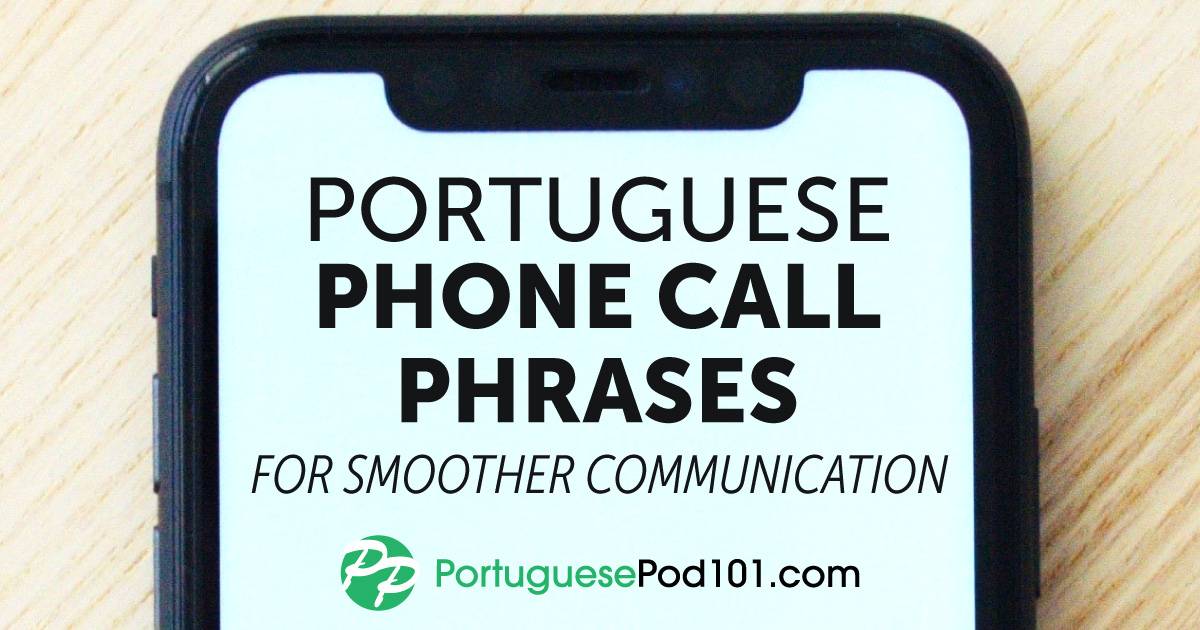
The biggest challenge for most language learners is actually speaking their target language. In order to have successful interactions with native speakers, one must have a solid working knowledge of the language in question. But luckily, we can also rely on subtle cues from body language, eye movement, and even the context to help us navigate our conversations with others.
That is, unless we’re on a phone call.
When speaking on the phone, we no longer have this additional input to fall back on.
If the thought of having a telephone conversation in Portuguese makes you anxious, you’re not alone. This is a common fear among learners of the language! How can you expect to put together a coherent sentence on the phone with a stranger, when it’s hard enough chatting with friends and acquaintances in person?
But if you know the rules, the game will be much easier to play. If you practice, you may actually end up enjoying the game!
In this article, we’ll teach you the most useful Portuguese phone call phrases for each stage of a phone conversation. Knowing these phrases will prepare you to greet your interlocutor, introduce yourself, handle both casual and professional calls, deal with connection issues, and much more. By the time you finish reading, you’ll be able to handle any phone call in Portuguese with greater ease and confidence—whether you’re phoning a friend, your boss, or a complete stranger.
- → If you’re short on time or want a snapshot before reading further, head over to our free vocabulary list Useful Phrases for a Phone Call!
 Table of Contents
Table of Contents
- Vocabulary Terms Related to Phone Calls
- Picking up the Phone
- Introducing Yourself
- Stating the Reason for Your Call
- Asking to Speak to Someone
- Asking Someone to Hold
- Leaving a Message
- Asking for Clarification
- Ending the Phone Call
- Samples of Telephone Conversations in Portuguese
- Takeaway
1. Vocabulary Terms Related to Phone Calls

Let’s get into the basics before we reach out to make a call, right?
Before you jump right into your next phone call, it would be wise to learn some general Portuguese phone call words and phrases. Here are some common terms you should know:
- Telefone – “Phone”
- (Telefone) celular – “Mobile phone”
- Telefone fixo – “Landline”
- Bateria – “Battery”
- Carregador – “Charger”
- Carregar / Recarregar – “To charge” / “To recharge”
- Ligação (telefônica) – “Phone call”
- Número de telefone – “Phone number”
- Ligar – “To call”
- Desligar – “To hang up”
- Ligar de volta / Retornar – “To call back”
- O telefone está tocando – “The phone is ringing”
You might want to learn some specific vocabulary related to mobile phones in our free vocabulary list Screen Time: Words and Phrases for Using Your Smartphone on PortuguesePod101.com.
Some phone phrases in Portuguese are suitable for both formal and informal contexts. Those that are only suitable in formal contexts are distinguished through the use of formal language. Here are some respectful terms you might use during a formal or professional phone call:
- Doutor / Doutora – “Doctor” or “Dr.”
- Senhor – “Mr.”
- Senhorita – “Ms.”
- Senhora / Dona – “Mrs.”
2. Picking up the Phone
Of course, your Portuguese phone conversation is going to start with a greeting. There are three common ways to answer the phone in Portuguese:
- Alô! – “Hello!”
- Pronto. – “Ready (to talk).”
- Estou. [Portugal] – “I am (listening).”
The most frequent phone greeting in Portuguese is Alô, though older people tend to answer the phone by saying their name or family name. This goes back to when landline phones were more common and people could not see who was calling or picking up.
3. Introducing Yourself
The next set of Portuguese telephone phrases you need to learn are those for introducing yourself:
- Aqui é o Pedro, sobrinho da Marisa. – “This is Pedro, Marisa’s nephew.”
- É a Ana. – “It’s Ana.”
- Quem fala? / Quem está falando? – “Who is speaking?”
- Sou amigo dele. / Sou amiga dela. – “I am a friend of his.” / “I am a friend of hers.”
Note: Amigo is the singular masculine noun for “friend,” while amiga is the singular feminine form.
A polite addendum is to ask if the person is busy before moving forward with your call:
- Você pode falar agora? – “Did I catch you at a bad time?”
- Você está ocupado / ocupada? – “Are you busy?”
Note: Ocupado is the singular masculine adjective for “busy,” while ocupada is the singular feminine form.
4. Stating the Reason for Your Call

“I’d like to make a dentist appointment.”
Things start to get interesting here—we’re getting somewhere. Here’s an informal Portuguese phone phrase pattern to discuss your reason for calling:
- Estou ligando para perguntar sobre a operação. – “I’m calling to ask about the surgery.”
- Estou ligando para saber das novidades. – “I’m calling to check on you.”
Now, here are some formal phrases:
- Eu gostaria de marcar uma consulta. – “I’d like to make an appointment.”
- Eu gostaria de confirmar a presença dela no meu evento. – “I’d like to confirm her presence at my event.”
- Eu queria fazer uma reserva para três pessoas para hoje à noite. – “I would like to make a reservation for tonight for three people.”
- Recebi uma ligação deste número e estou retornando a chamada. – “I’ve received a call from this number and am returning the call.”
5. Asking to Speak to Someone
Did you call the right number? Will you be able to reach the right person on this call?
Here are the most common phone call phrases in Portuguese for asking to speak to someone:
- Posso falar com a Marisa? – “May I talk to Marisa?”
- Marisa está? – “Is Marisa there?”
- É do gabinete da Dra. Márcia? – “Am I talking to Dr. Márcia’s cabinet?”
- Eu gostaria de falar com o Dr. Stefano, por favor. – “I’d like to talk to Dr. Stefano, please.”
Sometimes we know our reason for calling, but we aren’t sure who we need to talk to. But fear not. It’s simple to inquire about this:
- Com quem eu posso falar para resolver problemas sobre o meu plano de internet? – “Who can I talk to to solve problems with my internet plan?”
6. Asking Someone to Hold
Perhaps you’re the one receiving a call, and you need to ask the other person to wait while you retrieve information or transfer them to another department. Below are a few Portuguese telephone phrases you can use to ask the caller to wait a moment.
- Um minuto, por favor. – “Just a minute, please.”
- Um instante, por favor. – “Just a moment, please.”
- Poderia aguardar na linha por um segundo? – “Could you hold the line for a second?”
- Vou passar para ele / ela. – “I’ll put him / her on.”
- Vou lhe transferir para o escritório dele / dela. Não desligue. – “Let me transfer you to his / her office. Don’t hang up.”
7. Leaving a Message

“No problem, I’ll call later!”
If you’re unable to reach the person you wanted to speak with, you should have the opportunity to leave them a message. Below are a few common phone call phrases in Portuguese that are often used in this type of situation. Keep in mind that these phrases can be used in both formal and informal contexts.
- No momento, ele / ela não está. Gostaria de deixar um recado? – “(S)he is not here at the moment. Would you like to leave a message?”
- Ele / ela não está disponível no momento. – “(S)he is not available right now.”
- Não posso falar agora. Posso te ligar daqui a pouco? – “Can’t talk to you now. Can I call you soon?”
- Posso deixar um recado? – “Can I leave a message?”
- Você poderia pedir para ele / ela me ligar de volta ainda hoje? – “Would you ask him/her to call me back today?”
- Eu ligo depois então. – “I’ll call later, then.”
8. Asking for Clarification
Unfortunately, electronic communications are vulnerable to technical problems that can lead to misunderstandings. This is when we need to take a step back and take things slow. Here are several Portuguese phone phrases you can use to let your interlocutor know there are connection issues or to ask for clarification:
- Desculpe, não consigo te ouvir direito. – “Excuse me, I can’t hear you.”
- A ligação está ruim. – “The connection is bad.”
- O sinal (do celular) está péssimo. – “The (cell phone) signal is awful.”
- Você poderia soletrar seu nome, por favor? – “Could you spell your name, please?”
- Desculpe, a ligação caiu. – “I’m sorry, we got cut off.”
- Você ligou para o número errado. – “You’ve dialed the wrong number.”
- Desculpe, foi um engano. – “I’m sorry, I have the wrong number.”
- A bateria do celular está fraca. – “The cell phone battery is almost dead.”
If your mobile phone just isn’t working at all, maybe you should resolve some issues with your phone plan. In that case, don’t hesitate to check out our vocabulary list Words and Phrases for Talking About Your Phone Plan on PortuguesePod101.com.
9. Ending the Phone Call
It’s been an interesting ride. But all things must come to an end.
The final set of Portuguese phone call phrases you’ll learn today are those for ending the phone call.
- Muito obrigado / obrigada pela ajuda. – “Thank you very much for helping.”
Obrigado is used by male speakers to say “thank you” and obrigada is used by female speakers.
- Está bem. Nos falaremos mais tarde. – “Alright. We’ll speak later.”
- Até logo! – “Goodbye!”
- Tchau! – “Bye!”
If you’re ending a formal call, consider using this one:
- Obrigado / Obrigada por ligar. Tenha um ótimo dia. – “Thanks for calling. Have a great day.”
10. Samples of Telephone Conversations in Portuguese
You’ve now seen a variety of phone call phrases in the Portuguese language, but do you know how to use them? To make the learning process more organic for you, we’ve included two sample phone dialogues below. The first one is an informal conversation between two friends; the second one is a formal conversation between one of those friends and a restaurant attendant.
Informal telephone conversation in Portuguese

Set up an appointment in two steps: one formal call and one informal call.
Michel calls his friend Rosa to make an invitation for breakfast together on a weekend:
| Dona Lara: Alô! | Mrs. Lara: Hello! |
| Michel: Alô! Rosa? Aqui é o Michel, tudo bem? | Michel: Hello! Rosa? Michel speaking, how are you? |
| Dona Lara: Oi, Michel. Aqui é a mãe dela. Só um minuto, já passo pra Rosa. | Mrs. Lara: Hi, Michel. This is her mother speaking. Just one minute, I’ll put Rosa on. |
| Michel: Oi, Dona Lara! Desculpe, não te reconheci. Estou bem, obrigado. | Michel: Hello, Mrs. Lara! I’m sorry, I didn’t notice it was you. I’m fine. Thanks. |
| Rosa: Alô! Michel? | Rosa: Hello! Michel? |
| Michel: Oi, Rosa. Tudo bem? | Michel: Hello, Rosa. How are you? |
| Rosa: Tudo, e aí? Me desculpa, mas acabou a bateria do meu celular. | Rosa: I’m fine, how are you? I’m sorry, my phone’s battery is dead. |
| Michel: Sem problema. Escuta, você tem planos pro fim de semana? | Michel: No problem. Listen, do you have plans for the weekend? |
| Rosa: Não tenho nada marcado ainda. Por quê? | Rosa: I don’t have anything scheduled yet. Why? |
| Michel: Quer tomar um café da manhã no restaurante do clube no domingo? | Michel: Would you like to have breakfast in the club’s restaurant on Sunday? |
| Rosa: Acho a ideia legal, mas domingo eu vou à igreja. | Rosa: It’s a nice idea, but I go to church on Sunday. |
| Michel: E de sábado, você está livre? | Michel: What about Saturday? Do you have something on? |
| Rosa: De sábado está bem. A que horas? | Rosa: Saturday’s okay. At what time? |
| Michel: Legal! É às nove e meia, mas ainda vou ligar lá pra reservar. Depois te ligo pra confirmar, beleza? | Michel: Cool! At half past nine, but I still have to call to make reservations. I’ll call you later to confirm, right? |
| Rosa: Ótimo! Obrigada pelo convite. | Rosa: Alright! Thanks for the invitation. |
| Michel: Por nada! Até mais! | Michel: You’re welcome! See you later! |
| Rosa: Tchau! | Rosa: Bye! |
Formal telephone conversation in Portuguese
The two friends have set the time and place. Now Michel calls the restaurant to reserve a table.
| Atendente: Restaurante do Clube Gaivota, Regiane, boa tarde. | Attendant: Clube Gaivota’s Restaurant. Here’s Regiane, good afternoon. |
| Michel: Boa tarde, Regiane. Meu nome é Michel e eu gostaria de fazer uma reserva de mesa para o sábado. | Michel: Good afternoon, Regiane. My name is Michel and I’d like to make a reservation for a table for Saturday. |
| Atendente: Senhor? | Attendant: Sir? |
| Michel: Alô! Você está me ouvindo? | Michel: Hello! Are you listening? |
| Atendente: Desculpe, a ligação está ruim. Mas eu consigo te ouvir agora. | Attendant: I’m sorry, the connection is bad. But I can hear you now. |
| Michel: Certo. Gostaria de reservar uma mesa para dois no café da manhã de sábado. | Michel: Right. I’d like to make a reservation for two on Saturday for breakfast. |
| Atendente: Está bem. O café começa às sete e meia. A reserva é para que horas? | Attendant: Okay. Breakfast starts at half past seven. What is the time of the reservation? |
| Michel: Às nove e meia. | Michel: Half past nine o’clock. |
| Atendente: Certo, temos uma mesa disponível para este horário. A reserva é em nome de quem? | Attendant: Right. We have a table available for this time. Who’s making the reservation? |
| Michel: Michel. | Michel: Michel. |
| Atendente: Está bem, senhor Michel. A reserva foi feita: mesa para dois no sábado, às nove horas e trinta minutos. | Attendant: Alright, Mr. Michel. The reservation is complete: table for two on Saturday at half past nine o’clock. |
| Michel: Perfeito! Muito obrigado. Tchau, tchau. | Michel: Perfect! Thank you very much. Bye, bye. |
| Atendente: Até mais. | Attendant: See you later. |
11. Takeaway
The aim of this guide was to familiarize you with the most essential Portuguese phrases for a phone call. Once you have these down, you’ll feel more comfortable with both the relevant vocabulary and the more specific phrases for personal and business purposes.
Are there any phone call phrases or situations we didn’t include that you’d like to learn? Let us know in the comments and we’ll get back to you!
This is a great step toward improving your language skills. But if you want to go deeper, you’ll have to use more precise and powerful learning tools.
PortuguesePod101 offers a comprehensive teaching program that combines multimedia resources, short vocabulary lists, and detailed lessons for learners at every level.
You can learn even faster using our MyTeacher service. This gives you 1-on-1 interaction with a personal tutor who can help boost your performance while delivering solid results.
Master Portuguese phone conversations and so much more with PortuguesePod101!










